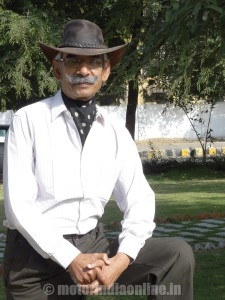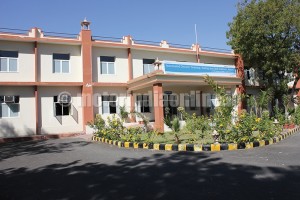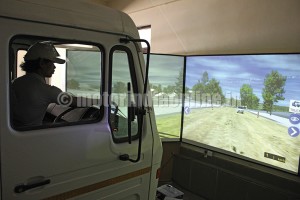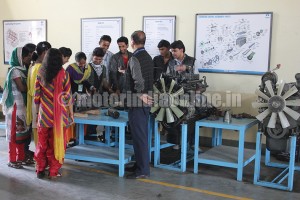Exhaustive training covers all categories
The historic city of Ajmer in Rajasthan now boasts of a unique institute that offers a certified automated drivers training course for those interested – gender no bar. It is a PPP initiative between Infrastructure Leasing & Financial Services Ltd. (IL&FS) and the Rajasthan State Road Transport Corporation (RSRTC), with Tata Motors offering more than technical support, as we find out in this exclusive report from Makhupura in Ajmer.
Currently the transportation industry in India is facing a severe driver shortage, and the prospects are gloomy with not many choosing to become drivers. The reasons range from their being an ignored lot despite being a critical part of the supply chain logistics that supports the nation’s economy, forced to face disrespect, harassment and fatal situations, including thefts and accidents, without any protection or insurance, to suffering from low self-esteem and a general feeling of being exploited.

The Automated Drivers Training Testing and Skill Institute set up in April 2014 under the PPP initiative by IL&FS as a joint venture with the National Skill Development Corporation (NSDC) and RSRTC, with technical support from Tata Motors, has stepped in to offer a solution in terms of conducting certified driver and automotive technical courses. The institute, a potential game changer, is situated in, and currently catering only to the people of Ajmer. With its first batch enrolled later in August, the institute offers three courses – in Light Motor Vehicle, Heavy Motor Vehicle and Auto Service Technician categories – that last for 21 days, 35 days and 45 days respectively.
The automated drivers training course currently covers a batch of about 25 students, wherein they undergo theoretical and practical training. The facility boasts of a training track, and vehicles like buses, trucks, and cars, besides simulators, a mechanical division and the like for hands-on training. The institute also invites outside faculties and experts to offer its students the taste of ‘real’ world, besides organizing on-road testing of the students under able supervisors. The experts teach the students the value of defensive driving, health and safety along with driving home the message of taking dignity in their chosen field.
Since inception, the institute has seen more than 50 successful students passing out the course. Col. (Retd.) Chandrabhan Singh Rathore, CEO of the institute, tells us about the passing percentage, and the placement of automated driver trainees specifically: “We regard it as a success when they obtain a driving licence from the Regional Transport Office (RTO). That is our aim of training. The institute has trained more than 1,000 students in all the three courses, with more and more girls and housewives joining the course for light motor vehicle training.”
Coming back to the automated drivers training course, Marketing Co-ordinator Devendra Ranawat says: “Training includes soft skills and computers as well. We have different tests – one is theoretical regarding traffic signals and rules, and the second is track testing. Later, once they obtain licences from the RTO, we try to find placements for them with logistics companies.”
In the current batch, a few are post-graduates, one is an MBA, and the others are graduates or less qualified. The institute receives both individuals and sponsored batches from either corporates or government departments like the Mining Bureau of Udaipur. Col. (Retd.) Rathore shares: “We have a flat fee of Rs. 10,000 for the auto-service technician course, Rs. 12,000 for the heavy motor vehicle course and Rs. 3,000 for the light motor vehicle course. These rates are approved by our executive committee, of which RTO Ajmer is also a member.”
The students spend 35 days to learn the art of driving, the mechanics associated with it, defensive driving, and the do’s and don’ts. At the end of the course, they receive certificates and then can apply for licences from the RTO. But how important are these driver training institutes? Col. (Retd.) Rathore explains: “We all know what sort of driving schools exist in the country. Most of them would be on paper only and everything happens in ‘back-date’. But I know that the product going out of my institute is a certified product which has had a certified syllabus and has undergone a certified training. It goes by the ethics given in the books and we follow the rule book to the T.”
These students are trained on the simulators and vehicles donated by Tata Motors. And it is mandatory for the trainers to undergo ground training designed by Tata Motors itself. Col. (Retd.) Rathore observes: “Tata Motors has gifted us six dual-control vehicles like Sumo, Indica and Magic designed for training purposes. They have supplied us all the training cut-model sections, and we have an open offer from them for receiving any technical support. In fact, one of our faculty members is an ex-Tata official.”
On-road test driving is part of the 15 mandatory hours of driving for these students. On one such test drive, the 25-odd students drove on National Highway 8 to Beawar city, about 60 km from Ajmer, taking turns at the wheel, while their hawk-eyed trainer, Mohammad Mustafa, meticulously noted down each one’s mistakes and high points. This former Army vehicle instructor says: “My role here is that of a trainer. Anyone can be a driver, but here we motivate them to become more than a driver. In the Army we are taught how to handle when a vehicle breaks down even in the middle of a desert. So I try to teach the students the same thing so that they face fewer problems like these in future.”
Everyday an early morning drill and jog for all the students under his guidance sets the tone for the entire day for these students.
Meeting truckers on the highway is a valuable experience for these students. In Beawar, the students met Krishna Yadav, long-haul driver of chemical tankers. Dressed in jeans and shirt, Yadav, a graduate, shared with them his experience that, being a long-haul driver, especially that of chemical tankers, is not easy and it requires keeping mind, body and emotions healthy and under control. But his grouse is, “in India, drivers are labelled as thieves even when we have all the papers right, cargo weight right, and all, and it does not change even if you are driving a foreign-built truck.”
Another driver, Bahubali, transporting tiles from Gujarat to Madhubani in Bihar, shares with students: “You can learn driving in a month but, it will take you more than that to know what the vehicle is saying to you, you need to learn how to solve problems even if you cannot find a mechanic to help you sometimes.”
More such institutes in different cities can change the way driving as a profession is viewed. Col. (Retd.) Rathore’s words ring true. “Earlier, he did not have infrastructure like this to train on simulator, then on tracks, then getting de-briefed after every test. Now it is available to the learner.”
Such institutes have the potential to offer the society trained, certified, responsible and dignified heavy commercial vehicle drivers.


